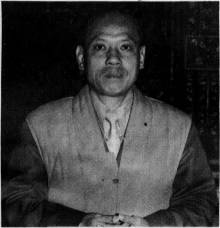
|
The Bodhi
Lectern INTRODUCING THE EMINENT DHARMA PROTECTOR UPASAKA CHU FEI |
|
|
Upasaka Chu Fei, whom many Buddhists know as the publisher and editor-in-chief of Bodhedrum Publications, was born around 1921 in Soochow, China. From a non-Buddhist family, in his early years he was exposed to all kinds of worship, of patriarchs and ancestors, spirits and gods, and it was only when he was sixteen, and saw a relative, his uncle, bow very respectfully to the Buddha, all five limbs to the ground, that he became interested in religion. He asked about the unusual style and the benefits of the full prostration and his uncle replied that it was good exercise if done regularly every day. His faith was awakened, and it was not long before he became a firm follower of the Buddha. |
|
When he was in Shanghai on a vacation from school he attended a series of lectures on the Diamond Sutra, and found them exceedingly wonderful to hear. Although he didnít understand it all at the time, his good roots were planted, and they went deep. It was not long before he took refuge with the Venerable Master Ying Kuang, a Patriarch of the Pure Land School dwelling at Ling Yen Mountain, who sent him a long letter along with several books; Upasaka Chu was delighted. Thereafter he became a vegetarian, in spite of his familyís displeasure. His practice was scorned as that which only old feeble people undertook, but his resolve was firm, and he remained a vegetarian for three years until he had a serious attack of malaria and his familyís wishes prevailed. He returned to vegetarianism again as soon as he had the opportunity. When the Second World War was over and mainland China was in turmoil of civil strife, he departed for Taiwan. When he arrived in 1948 he settled in Taichung and took up library work, and began the practice of eating only the vegetables cooked alongside meat. He was twenty-seven years old at the time. There he started his first Buddhist periodical. Birth of Enlightenment, and worked diligently at it until differences with his co-publisher made him decide to give his share away and strike out on his own. In 1952 he launched Bodhedrum magazine, and has published it faithfully every month for the past twenty-two years, serving as the publisher, editor, reporter, and staff photographer. When asked why he named it Bodhedrum (Bodhi Tree) he replied that he found the leaves of the bodhi tree beautiful and inspirational, so much so that he made a vow that he would go to India and bow to the bodhi tree. At the time he made the vow it was impossible to travel from China to India, but after eleven years the opportunity came, and as a member of a delegation representing Chinese Buddhism he traveled to India, and while there, bowed to the bodhi tree. He was flooded with tears, and couldn't get up, but the extraordinarily unique experience that marked the fulfillment of his vow has stayed with him ever since. Upasaka Chu got married when he was thirty, and with his wife, also a devout Buddhist and a strict vegetarian, has upheld the rules of pure eating ever since. His wife, a teacher, has also greatly assisted him in the work on Bodhedrum. Recently he has been able to have two more people to help out; nonetheless, throughout the early years when he published the periodical by himself he encountered many obstacles, and Bodhedrum Publications, because it has published many Buddhist books besides the magazine, has been a great deal of work from the very beginning. Because of his early ties with the Venerable Yin Kuang, Upasaka Chu has emphasized practice of the Pure Land School, and at home practices recitation of the Buddha's name. When he is not busy publishing and reporting Buddhist events he often speaks to student groups and at schools. About the success of his magazine, he said, "If a disciple of the Buddha has faith, and makes strong vows, and then works hard, it is not possible that he will not accomplish his aim. Nothing can go wrong." Upasaka Chu on a recent visit to the United States resided for a short time as a guest at Gold Mountain Monastery in order to take the opportunity to draw near an Elder Master with great virtue in the Way. He was delighted to have the opportunity to join the Avatamsaka assembly and participate in some of Gold Mountain's round of practices, and tied up Dharmic conditions with a speech to the great assembly, which appears in NEWS FROM THE DHARMA REALM in this month's issue. |